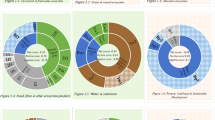
Overview
- Seeks pathways for climate change adaptation and social transformation
- Encapsulates comprehensive goals on gender equality, women’s empowerment
- Introduces transformative ideas to introduce gender transformative approaches to address climate change adaptation
Part of the book series: Springer Climate (SPCL)
Access this book
Tax calculation will be finalised at checkout
Other ways to access
About this book
This book offers an array of narratives and recommendations for gender-transformative climate change adaptation strategies based on research and evidence from the Global South. We look at gender-transformative adaptation (GTA) as a process that aims to address gender and power imbalance and strive for a change at the institutional level to enable empowering consequences through the meaningful and equal participation of women and men in leadership, policy, and decision-making processes. It makes four main contributions. First, it collates scholarship on the politics of adaptation and how policies affect men and women differently in communities and different geographical locations. Second, it captures pathways for parallel goals of `climate action' (SDG 13) and `achieving gender equality and empowerment' (SDG 5) through transformative ideas. Third, it curates new methodologies and adds knowledge to the gender transformative research (GTR) and assesses its potential for challenging and addressing gender power equations. Fourth, it voices the parallel ideas and evidence, placing women as both “victims of climate change” and as the “new change makers” in the path of climate adaptation.
Similar content being viewed by others
Table of contents (20 chapters)
-
Front Matter
-
Concepts and Overview of Gender and Climate Change
-
Front Matter
-
-
Vulnerability to Climate Change and Disproportionate Burden on Women
-
Front Matter
-
-
Women as Change-Makers: Gender Transformative Climate Adaptation
-
Front Matter
-
Editors and Affiliations
About the editors
Prof. (Dr.) Anindita Sarkar currently holds the position of Senior Researcher at the Department of Ecology and Natural Resources Management at the Centre for Development Research (ZEF), University of Bonn, Bonn, Germany. She is a Professor at the Department of Geography at Miranda House, University of Delhi, India, where she has been teaching since 2005. She has worked on research projects in Kenya, Bangladesh, Nepal and India, funded by government and international organizations. She has been associated with various organizations like The Future Earth, ACIAR, World Bank, IWMI, NCERT, ICSSR and IGNOU in various capacities. She has numerous publications in refereed journals and books. Her research areas include natural resource management, water insecurity, agricultural sustainability, gender, and rural livelihoods. Her research is anchored at the intersection of development and environment, and her work shows how technologies and policies of resource use and access shape spaces. Her published work focuses on how policies facilitate or impede water access through institutions influencing food security, water security and livelihood security of people. She has authored the book Water Insecurity and Water Governance in Urban Kenya: Policy and Practice published by Palgrave Macmillan, Springer Nature and co-edited ‘Addressing Risk, Uncertainty and Maladaptation to Climate Change’ by Springer Nature. She received the UGC Research Award in 2016 and has been conferred with the Delhi University Excellence Award for her outstanding contribution to research and academic activities in 2023. She is a human geographer and holds a PhD and MPhil focusing on groundwater depletion and agricultural development.
Dr. Nairwita Bandyopadhyay currently works as an Assistant Professor of Geography at Haringhata Mahavidyalaya, University of Kalyani, India. She holds a Ph.D. from the Delhi School of Economics, University of Delhi. Her thesis was titled "Drought Impact Assessment and Analysis of Drought Policy in Gujarat". She also holds an M. Phil (First Class with Distinction) and an M.A degree in Geography (First Class) - with special papers in Remote Sensing and GIS, Disaster Management, and Environmental Impact Assessment - from the University of Delhi. She was selected among the six finalists for the Rising Star Women Leadership Award for UNDRR and represented India at the APMCDRR conference in Manila, Philippines. She was awarded First Prize - Prof. Adya Sharan Young Women Geographer's Award - at the 45th Indian Geography Congress (2023) by the National Association of Geographers in India, the Best Paper Award - N.P. Aiyyar Young Geographers Award (2016). Her papers were published in several reputed international peer-reviewed journals, Elsevier, Natural Hazards, GIS Science and Remote Sensing, Springer, Routledge, etc., with over 348 citations. She has contributed numerous book chapters to several books published by reputed international publishers and authored one. She has participated in international seminars and presented papers in Germany, Spain, Greece, Philippines, Bangkok and China, as well as in training programs conducted by NASA and NIDM under the Ministry of Home Affairs, the Govt of India, and the World Bank. She has co-edited three books for Springer Nature: Risk, Uncertainty and Maladaptation to Climate Change: Policy, Practice and Case Studies, `Indigenous Knowledge and Disaster Risk Reduction', and `Urban Commons and Future Smart Cities and Sustainability'.
Accessibility Information
PDF accessibility summary
EPUB accessibility summary
Bibliographic Information
Book Title: Gender-Transformative Approaches for Climate Change Adaptation
Book Subtitle: Policies and Practices from the Global South
Editors: Anindita Sarkar, Nairwita Bandyopadhyay
Series Title: Springer Climate
DOI: https://doi.org/10.1007/978-3-031-90236-9
Publisher: Springer Cham
eBook Packages: Social Sciences, Social Sciences (R0)
Copyright Information: The Editor(s) (if applicable) and The Author(s), under exclusive license to Springer Nature Switzerland AG 2025
Hardcover ISBN: 978-3-031-90235-2Published: 15 July 2025
Softcover ISBN: 978-3-031-90238-3Due: 29 July 2026
eBook ISBN: 978-3-031-90236-9Published: 14 July 2025
Series ISSN: 2352-0698
Series E-ISSN: 2352-0701
Edition Number: 1
Number of Pages: XXVII, 430
Number of Illustrations: 6 b/w illustrations, 69 illustrations in colour
Topics: Climate, general, Gender Studies



